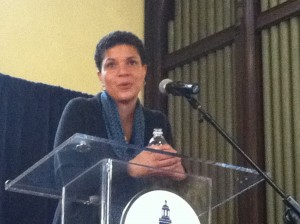Listen to Michelle Alexander on TheFightBack:
Audio clip: Adobe Flash Player (version 9 or above) is required to play this audio clip. Download the latest version here. You also need to have JavaScript enabled in your browser.
“If he had been raised in the hood, the odds are high he would’ve been stopped, he would’ve been frisked, he would’ve been caught,” Michelle Alexander said of Barack Obama, who has admitted using drugs in his youth.
“Far from being president of the United States, he might not even have the right to vote. He might be cycling in and out of our criminal justice system along with the rest of us,” Alexander said in a lecture at Howard University on Thursday.
Alexander’s 2010 book, The New Jim Crow: Mass Incarceration in the Age of Colorblindness, has received widespread acclaim for pulling back the curtain on America’s prison system, which is unique in the world.
“The United States imprisons a larger percentage of its black population than South Africa did at the height of apartheid,” writes Alexander. “In Washington, D.C., our nation’s capital, it is estimated that three out of four young black men (and nearly all those in the poorest neighborhoods) can expect to serve time in prison.”
What’s more, upon release ex-offenders or returning citizens face serious obstacles which frequently prevent them from obtaining housing, a job, or even food stamps, notes Alexander.
Reading from the introduction to her book, Alexander told the nearly full house at Andrew Rankin Memorial Chapel:
“What has changed since the collapse of Jim Crow has less to do with the basic structure of our society than with the language we use to justify it. In the era of colorblindness, it is no longer socially permissible to use race, explicitly, as a justification for discrimination, exclusion, and social contempt. So we don’t. Rather than rely on race, we use our criminal justice system to label people of color ‘criminals’ and then engage in all the practices we supposedly left behind.
“Today it is perfectly legal to discriminate against criminals in nearly all the ways that it was once legal to discriminate against African Americans. Once you’re labeled a felon, the old forms of discrimination – employment discrimination, housing discrimination, denial of the right to vote, denial of educational opportunity, denial of food stamps and other public benefits, and exclusion from jury service – are suddenly legal. As a criminal, you have scarcely more rights, and arguably less respect, than a black man living in Alabama at the height of Jim Crow. We have not ended racial caste in America; we have merely redesigned it.”
Alexander called on citizens of conscience to help build an “underground railroad” for those returning home from incarceration.
Related Stories:
Ban the Box, End the Discrimination, Part I, March 14, 2011

